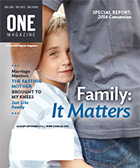
August-
September 2014
Family: It Matters
------------------
|

Make the Most of Mentoring
by Joy Corn
Mentoring is a hot topic these days. Businesses use internships and mentors to train workers in specialized techniques. The education world offers opportunities for volunteers to mentor students with deficits in core skills. Boys and Girls Clubs of America and many similar organizations recruit mentors for children with few good role models.
In every mentoring situation, the mentor must meet two requirements: 1) he or she must have more experience or knowledge than the trainee, and 2) he or she must be sincerely interested in someone else’s growth.
These simple requirements transfer into the spiritual realm as well, where Christians are instructed to “teach” the next generation with patience and perseverance. It is a calling we all need to embrace. In Titus 2:3-5, Paul described the role of a mentor in terms of the older teaching the younger. He began the chapter with instructions for aged men, then followed with instructions for older women.
He said to Titus, “The aged women likewise, that they be in behaviour as becometh holiness, not false accusers, not given to much wine, teachers of good things; that they may teach the young women to be sober, to love their husbands, to love their children, to be discreet, chaste, keepers at home, good, obedient to their own husbands, that the word of God be not blasphemed”
Perhaps you are already a long-time “mentor.” You see yourself in Paul’s description of “older men and women” in Titus. You make a practice of planting seeds of wisdom in others. Others may identify with the “young men and women” in this passage, still learning, not yet the seed planters. The truth is, every Christian should be both—never too old to learn and never too young to teach. Two important phrases in these verses give us insight into the characteristics and methods of mentoring.
Informal
The phrase “teachers of good things” in verse 3 does not refer to formal instruction such as a lecture or sermon, even a lesson. Rather, it describes informal instruction combined with personal example. Mentoring is informal. We must teach during the everyday, teachable moments of life.
I remember Haddon Robinson describing the moment when his father prevented him from stealing a ride on the subway by slipping underneath the turnstile. He said, “That was a teachable moment for me.” No doubt you have experienced many similar moments when life presented an opportunity to speak into someone’s life, whether to your own children or to others within your sphere of influence. Informal moments are fertile soil for lessons of all sorts—including lessons about loving God and about eternity.
My first mentor was my mother. She was a master at using informal lessons of life. You can’t get more informal than posting Scripture on the back of the bathroom door. I must have read Psalm 1:3 hundreds of times in the years that verse was posted in our bathroom: “And he shall be like a tree planted by the rivers of water, that bringeth forth its fruit in his season; his leaf also shall not wither; and whatsoever he doeth shall prosper.”

I was always intrigued that my mother could quote verses to any hymn I chose (and hum the tune). Those words and tunes were planted in my heart like seeds. I know many hymns today because my parents sang them in the car or Mother played and sang them at the piano.
In third grade, my teacher Elsie Jackson assigned a science project to put together a series of reports on the planets and heavenly bodies.
I will never forget my mother’s suggestion to use Psalm 8:3-4 on the cover: “When I consider thy heavens, the work of thy fingers, the moon and the stars, which thou hast ordained; what is man that thou art mindful of him?” That suggestion became a teachable moment. It taught me to take a bold stand about my faith…at least it seemed bold for a third grader in public school.
Intentional
We learn a second characteristic of mentoring from the word teach or admonish in verse 4. This Greek word relates a totally different meaning from the word teacher in verse 3. The transliteration sophronizo, from which we derive our modern term sophomore, gives us insight into the meaning. Perhaps you’ve heard the definition of sophomore: a wise fool, one with pretense of intellect. This Greek word makes it clear a mentor should bring others to their senses about life and steady them through exhortation and guidance.
Put most simply, mentoring is intentional. You must have a plan for mentoring. Yes, some life lessons come about naturally, but others are taught only through intentional planning. You may have to go out of your way to make the lesson stick. Like the time when I was ten, and my mother and daddy challenged me to read through the Bible, with the promise of a new Bible (with my name engraved on it) for completion. I accepted the challenge and used that Bible from fifth grade through college.
Take a moment to consider who could benefit from your experience—perhaps someone in your family, a neighbor’s child, or a new attendee at church. Maybe it is a young mother who would welcome the seasoned experience of someone who has “been there.” Be intentional as you strive to mentor. Deliberately seek out those without godly influences. Mentoring must be intentional.
Methods of Mentoring
Return to the phrase “teachers of good things” in verse 3 to find insight into the methods of mentoring. First, we teach through example. Great mentoring is built upon example. My mother never delivered a sermon on cooking Sunday dinner, a lecture about taking care of things, or a diatribe about being wasteful, but her consistent actions spoke volumes. She gave no speeches about loving your neighbor, but I saw her live this out. Through her consistent example, I learned about managing time, getting enough fresh air, the importance of family meals, frugality, consistency, loyalty, and church involvement. Effective mentoring is lived rather than spoken.
My sister has been and continues to be an influential mentor. She sets an example in generosity (She gave her husband a kidney, for Heaven’s sake!), hospitality, and curiosity. She is always ready and willing to help. She takes a genuine interest in the lives of others and helps them feel welcome and important. She continues to learn and to seek out wisdom. Carol sets a high bar with her example, and I want to be that kind of example for others.
Verse 4 sheds more light on mentoring methods. Mentoring should be focused on encouragement. Bringing “younger women” to their senses about their roles in life involves encouraging them, steadying them through exhortation and guidance.
Two examples come immediately to mind. The first is June Critcher, my Sunday School teacher and later pastor’s wife. Mrs. Critcher was a great encourager to me, particularly during my teen years. She taught the “Teen-ette” Sunday School class, and took genuine interest in the details of our lives. I remember her calling on the morning of a state math competition in ninth grade to assure me she was praying for me. As a fresh graduate of eighth grade home economics, she paid me to hem dresses and mend clothes for her children. She often asked me to sing a particular song as a special during the days when my nerves were almost debilitating. These early votes of confidence were empowering.
Mrs. Critcher encouraged my all-girl Sunday School class to memorize Scripture. First, we learned passages about being godly women, then godly wives. Later, she pushed us to memorize the entire first chapter of James. Her encouragement was a seed that gradually grew into confidence and bore much fruit over the years.
A second mentor encouraged me in a professional context. I was privileged to work with Betty Plunkett at Pleasant View Christian School for nearly 10 years. She was a wonderful example and mentor to students, with a unique way of making everyone feel important. “Problem” students especially respected her because she loved them unconditionally. She provided a great example of diligence, consistency, and willingness to stand on principle. But she was also an encourager to me.
I went to visit Mrs. Plunkett at Alive Hospice only a few days before she died from cancer. Even in her weakened state, she had not lost the gift of encouragement. Knowing I had a challenging class, she spoke empowering words of wisdom and insight—making me feel special to the very end. She was a wonderful encourager and mentor.
The goal of every mentor is to build up the lives of those we touch. These verses ultimately instruct us to train others in such a way that God will receive glory from their lives, and “the Word of God be not blasphemed.” So make the most of mentoring and start changing someone’s life today.
About the Writer: Joy Corn teaches math at Pleasant View Christian School. She is president of Cumberland Association Women Active for Christ. Learn more about WNAC at www.wnac.org.
|
|

